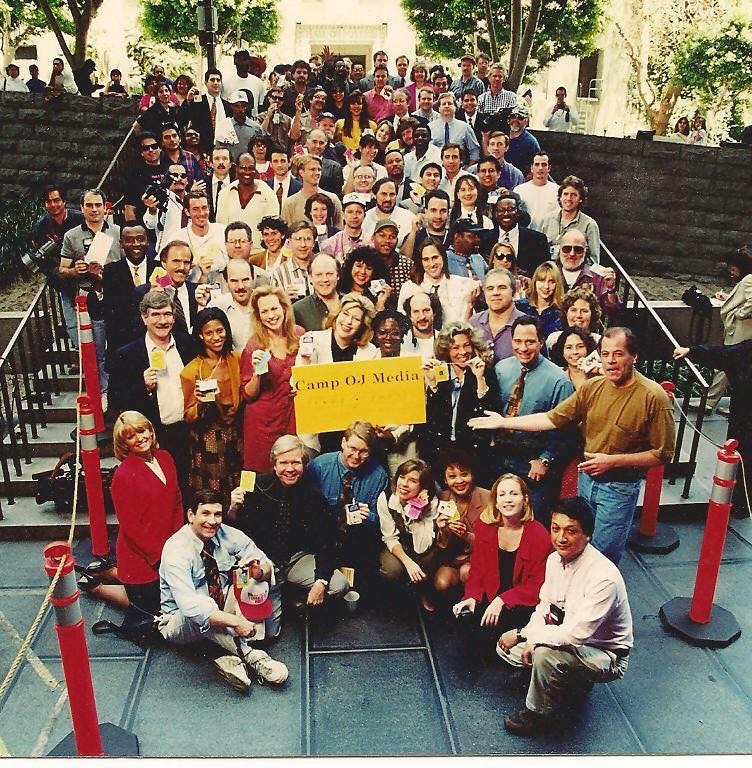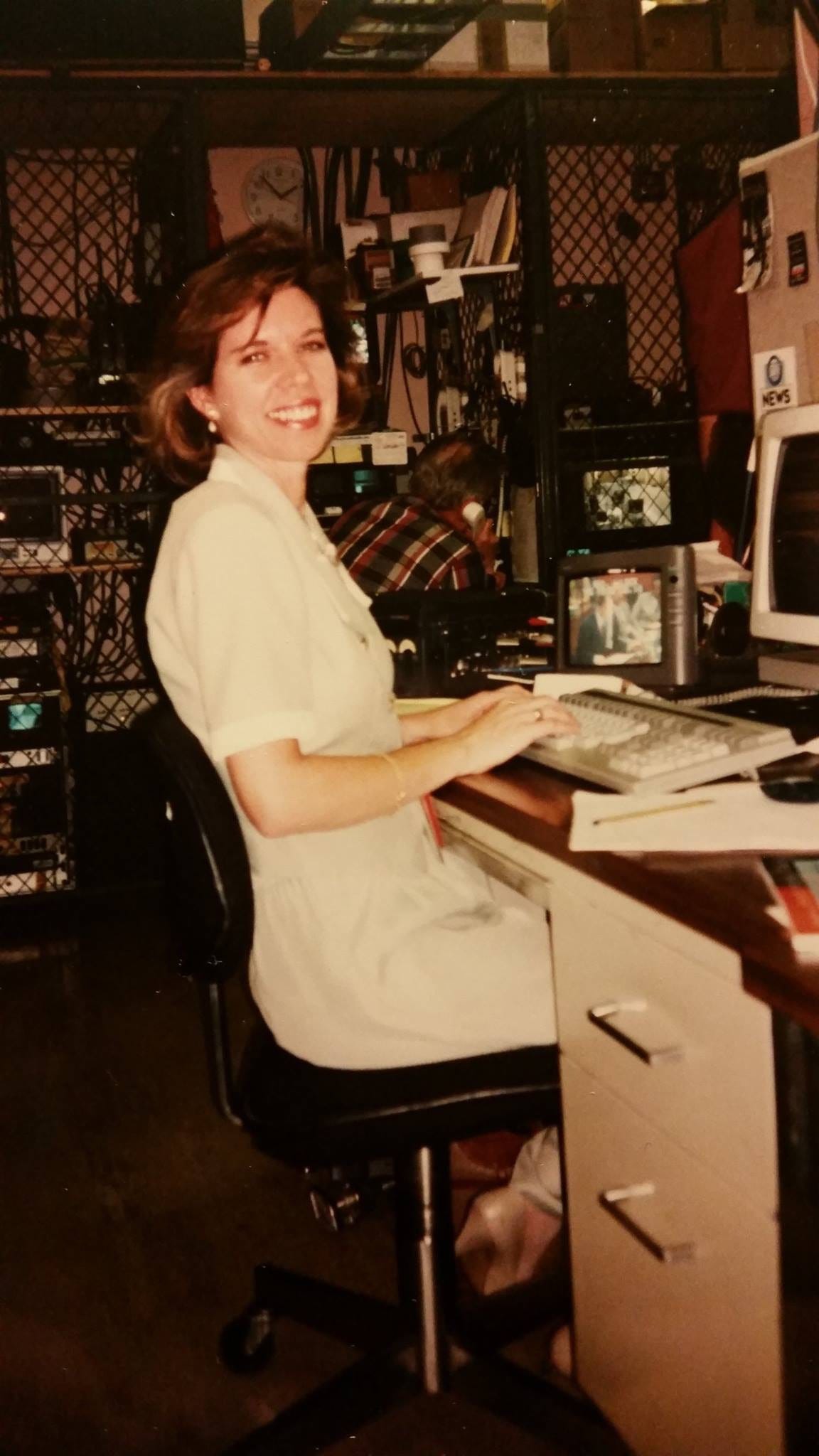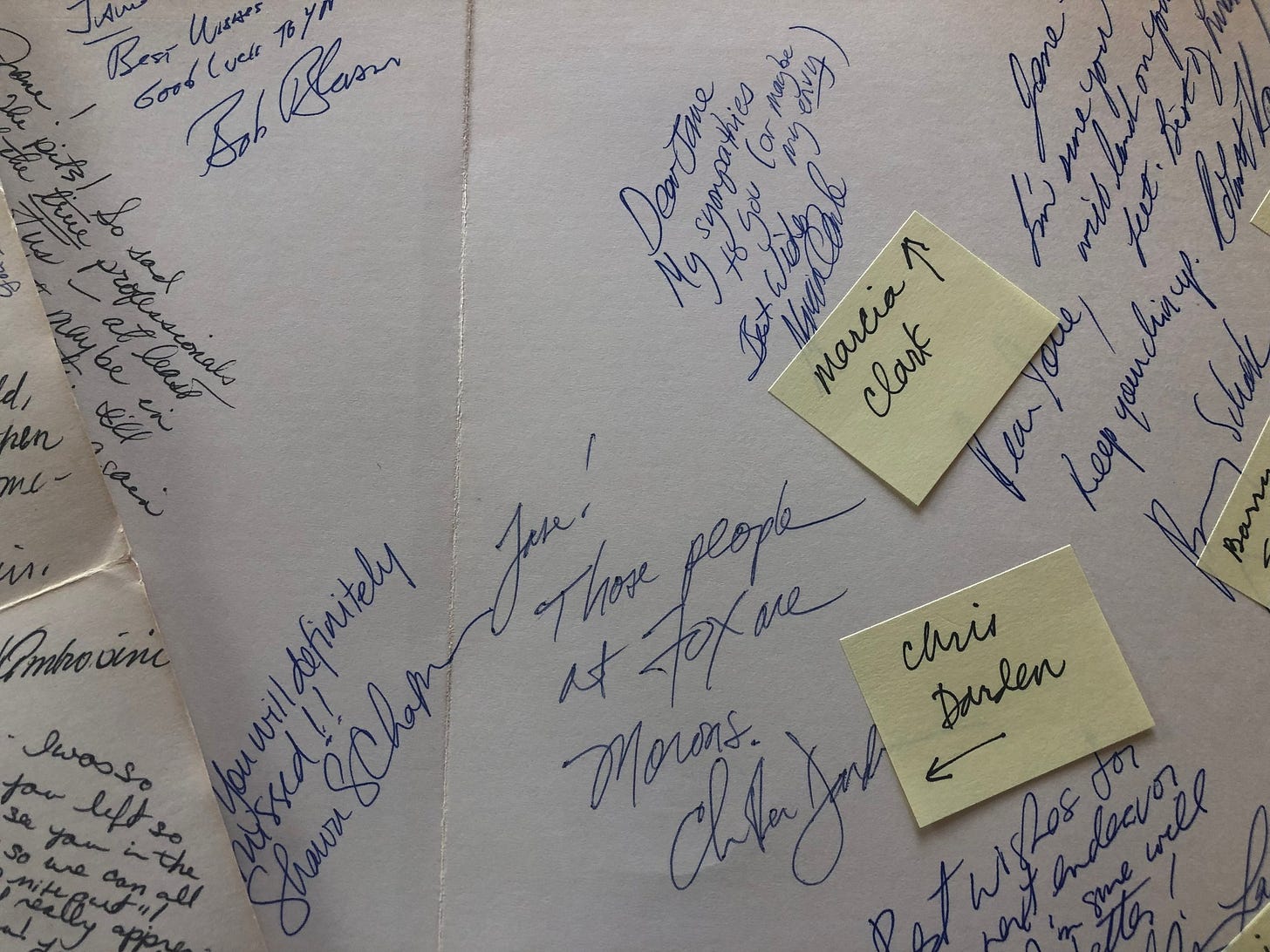How the O.J. Simpson Case Changed My Career (and all the decisions that followed)
Sometimes, it’s not about the money.
I’m writing this month about women and work. Specifically, how to negotiate for more pay.
But sometimes, people change jobs or careers for reasons other than money, and they still end up better off.
Here’s my story.
Since June 12th is the 28th anniversary of the murders of Nicole Brown Simpson and Ronald Goldman, I may as well start there.
I quit my job.
After a dozen years as a news reporter in various markets, I walked away from a high-paying job in August, 1995, at the height of the O.J. Simpson criminal trial. I decided I wanted to be more of a mother and less of a journalist, though my financial decision threatened to cost my family our home.
Moms with careers — and many dads — suffer an endless cycle of guilt. Nobody gets 100% of your attention, neither your family nor your employer, let alone your spouse or yourself. Each day you have to decide where your focus is going to be. It’s a series of trade-offs.
But a funny thing happened after quitting my job to spend a teensy bit more time with my kids: My career took off.
Here's what happened, according to me.
I covered the murders of Ron and Nicole from the beginning — the morning after their bodies were discovered in Brentwood. I was working for the local Fox affiliate in Los Angeles.
I remember thinking in shock that morning, “Oh man, O.J.’s wife died.” (Early reports identified Nicole as his wife, not his ex.)
I felt bad for O.J.
Everybody felt bad for O.J.
Soon we learned that he’d been in Chicago (alibi!) and was now flying back to Los Angeles.
But at his house that afternoon, we saw LAPD officers handcuffing O.J. and taking him down to headquarters for questioning. “What the….?” I thought. “They think O.J. had something to do with this???”
It was a crazy week that ended Friday with an even crazier freeway chase and Simpson’s surreal arrest. I covered it all.
That summer, O.J. was pretty much the only story I covered.
Quick Aside — Six Degrees of O.J.
Everyone in L.A. knew someone associated with the investigation. In my case, my husband flew in the U.S. Navy Reserve with Wayne Stanfield, the American Airlines captain who flew O.J. to Chicago the night of the murders.
I found out about Wayne’s involvement only after I caught my husband discussing the Chicago flight with Wayne’s neighbor. (The hubby had avoided telling me because he didn’t want me to pester Wayne.)
Well, I pestered Wayne — a little — after learning he’d been the pilot. No one had reported this. Wayne told me that when he heard O.J. was in first class on the flight, he went back to meet him and shake his hand. O.J. even autographed Wayne’s logbook, “O.J. Simpson, Peace to You.”
I asked Wayne if he’d noticed any cuts on O.J.’s hand during the handshake (Simpson had a cut on his finger when police arrested him). Wayne didn’t notice a cut, and he’d go on and testify to that in court.
But that summer, long before the trial, I broke the story about Wayne, the logbook, and the handshake with O.J.
TAKEAWAY #1 — Keep your ears open. Stories are everywhere. And be nice to your husband.
Copy of Wayne's flight logbook from the night of June 12, 1994.
Back to why I quit.
As the criminal trial kicked off in January, 1995, it was my job to report from the courthouse during our daily live coverage, and also provide a summary for the 10 P.M. newscast.
In the media room at the Criminal Courts building in 1995.
I was often up at 4 a.m. and seldom returned home before 11 p.m. My children were ages 5 and 3 at the time, and I was leaving the house before they got up and coming home after they’d gone to bed. I remember tiptoeing in every night to kiss them as they slept.
It was awful, but I was making it work with the help of my amazing husband, my amazing mother, and an amazing part-time babysitter. This was, after all, The Trial of the Century, and I knew it wouldn’t last forever, so I pushed through. But as the months dragged on, the all-work-no-life balance became intolerable. (I even dragged my five-year-old to the courthouse for Bring Our Daughters to Work Day just to spend time with her. She grew up to become a lawyer.)
Then my father died in July. His loss made me reassess priorities.
Something had to give.
My contract was up at the end of August, and I went to my managers and told them that after the criminal trial ended, I wanted my next contract to give me a four-day work week. I didn’t want a raise. In fact, I said I would happily take a 20% pay cut.
This was 1995. Deals like this were unheard of, but that’s the deal I wanted, and I told them if I didn’t get it, I‘d walk away. No job was worth it.
As the final weeks of my contract went by, management continued to tell me they were considering my four-day proposal, but they hadn’t made a decision yet. I think they thought I was bluffing.
Finally, the day before my deal expired, I was at the criminal courthouse when my boss called. He told me the station would not give me a four-day work week. They also didn’t make me a counteroffer, but it didn’t matter. Four days or no deal.
“Well, tomorrow is my last day then,” I said.
And it was.
When I went home and informed my husband, he was, to say the least, stunned. I’m not sure he thought I would go through with it, but he was fully on board, despite the significant hit to our income.
My decision sent shockwaves throughout the newsroom and into the courthouse. One female anchor wrote me a note commending me for my decision. NBC News producer Cathy Suen sent cards around the courthouse to be signed by everyone with messages of support, including Marcia Clark.
I called my AFTRA union representative to remind him that I was due severance pay. I had a solid case: The station had not offered me a contract; I’d only been told my offer was not accepted. Therefore my employment was severed. He called me back and said that station management told him they did make me an offer. “No, they didn’t,” I said. He replied, “Jane, why would they make that up?”
My own union rep didn’t believe me. (I’m pausing here to take a few deep breaths... more than a quarter century later, I’m still appalled.)
Anyhow, I knew I made the right decision. I also knew that I needed to find some work. But where?
I was out of a job for just one week.
TAKEAWAY #2 — There’s life (and opportunity) after quitting.
“Are you available?”
My second week at home, a rival station called and asked me to cover the trial as a freelancer, so back to the courthouse I went.
That same week, I got a call from WNBC in New York. They’d just let their trial reporter go, and they were desperately looking for someone to fill in.
One of WNBC’s producers, Ramona Schindelheim, had worked with me at Fox, and she’d heard from my former managers that I was no longer employed. She mentioned me to her news director, Bruno Cohen. He decided to try me out for two weeks.
I was now covering the biggest story in the country again, but this time for the flagship NBC station in the nation’s largest media market. This was definitely a step up.
After my first report, I received the following feedback from Bruno’s team: “Great reporting, but can you do something about your hair?”
My hair?
In TV, it’s all about The Hair. The Hair is almost more important than what you say, because people won’t listen to you if your hair is driving them crazy. And now that I was in “the big leagues,” I needed to start paying more attention to The Hair.
I invested in some hot rollers and better hairspray, and WNBC viewers seemed to like me, my reporting, and My Hair.
TAKEAWAY #3 — Don’t ever ignore The Hair.
Between Trials
I covered the criminal trial for WNBC through the not-guilty verdicts in early October, 1995. Fred Goldman, Ron’s father, then announced he would pursue Simpson through a civil trial.
Over the next year, in between trials, WNBC agreed to keep me around a couple days a week to continue covering O.J. developments. I managed to pick up another couple days freelancing at a local station. Together, I had the four-day work week I wanted. I was making a less money, but it was enough to help cover the bills. More importantly, I had one extra day a week with my children, and that was everything. I volunteered at school! We went to the beach!
When the civil trial began in September, 1996, I agreed to work five days a week through the verdict. WNBC split the cost of my coverage with CNBC’s “Rivera Live,” so I covered the story for both networks.
This was my first personal exposure to Geraldo Rivera. I was hesitant, given his reputation for stunts (the vault!) and the over-the-top antics on his daytime talk show (the bloody nose!).
It was the best thing that ever happened to me professionally.
Geraldo never interfered with my coverage, never suggested that I have a “take,” and he convinced his audience that I was the best damn reporter on the case. Ratings for our live coverage of the civil verdict in February, 1997, were CNBC’s highest ever at the time.
But after the verdict, my run with WNBC and CNBC came to an end. I was out of work again.
I started interviewing at various networks. The ABC News bureau chief in Los Angeles met me for lunch. He asked disdainfully, “How could you work with Geraldo?” To which I replied, “If I hadn’t worked with Geraldo, you wouldn’t know who I am, and we wouldn’t be taking this lunch.”
And as loyal readers know, being on “Rivera Live” also led to the cameo of a lifetime: playing myself on the finale of “Seinfeld.”
Meantime, I still needed a job.
“Get that woman off the air!”
A week or two later, my phone rang again. This time it was a former producer and desk manager from the local CBS affiliate named Maryhelen Campa. She’d just gone to work for the relatively new Fox News Channel, and they needed reporters in L.A. She asked if I was available.
I told her yes, but only four days a week. “Great!” she said.
The bureau was located at the time in an old bungalow off Hollywood and Vine. The reporting staff was a motley crew of out-of-work L.A. journalists hired by Fox News to cover the west coast. I referred to us as “The Island of Misfit Toys.” We were led by Fred Farrar, a former producer for ABC’s “Good Morning America,” and the best boss I‘ve ever had.
Shortly after I started at Fox, Fred got a call to notify him that Roger Ailes had expressed concerns about me. Apparently a former manager who was at the local Fox affiliate when I quit told Roger, “Get that woman off the air!” I believe the actual language was saltier.
Fred called me into his office and asked me why someone would say that. I told him exactly what happened when I quit. He paused (he was big on pausing), then said, “Okay. See you tomorrow.”
TAKEAWAY #4 — Be honest, and trust that it’ll all work out.
And that was that. I was not pulled off the air. In fact, I worked for Fox for a year and a half... four days a week.
During that time I covered the most fascinating story of my career, but only after I again chose family over work.
“Do you want to go to London?” Um, no.
On August 31, 1997, Princess Diana died in a car crash. Fox News sent a team to London to cover the story ’round the clock, asking me if I could go.
I said no.
Insane, right? Princess Diana just died and I said ‘no’ to the story.
Well, it was insane, and it pained me to say no. But my son was starting kindergarten that week. I asked myself, “On your deathbed, will you be glad you went to London to cover the biggest story in the world, or that you took your son to kindergarten, even though he won’t remember?”
The answer was obvious.
OMG he's turning 30 this year.
And then someone else died.
The day after I took my son to his first day of kindergarten, Mother Teresa passed away. Fox asked me if I’d go to Calcutta.
I said yes.
Now, I don’t want to say that Mother Teresa was rewarding me or anything, but going to Calcutta was an incredible, challenging, and wonderful experience. It was, hands down, the best story I’ve ever covered. I’ll never forget it.
TAKEAWAY #5 — Stick to your guns, you’ll be rewarded.
The inexperienced but hard-working Fox News team in Calcutta, Sept. 1997.
CNBC Comes Calling
In August 1998, Geraldo landed a primetime newscast at CNBC called “Upfront Tonight.” He wanted me to be the lead correspondent.
I’d been working part-time for the better part of three years by now, and my children were in school full-time. I felt ready to go back to working five days a week. CNBC hired me for Geraldo’s newscast, paying me more than I’d ever earned. I covered the biggest stories in the country, from the impeachment of Bill Clinton to the death of JFK Jr. to the massacre at Columbine.
The Columbine story was not the first school shooting I covered, but I decided it would be the last. After 17 years reporting on so many tragedies, I wasn’t sure I could take any more. So as “Upfront Tonight” wound down in the summer of 2000, my career took one last, wonderful turn.
By this time, Bruno Cohen, who’d hired me at WNBC to cover the Simpson saga, had moved over to CNBC to head up business news. He asked me if I’d consider moving dayside, but I didn’t think I’d enjoy covering the stock market.
We met for lunch one day in Los Angeles, and Bruno told me, “I need storytellers.” He explained that the business world is full of great stories, and he gave me a copy of the Wall Street Journal and said, “read this, cover to cover.”
I did. I learned a lot. I loved the stories.
So in August, 2000, I moved to dayside and covered my first business story — something about semiconductors — and ever since, I’ve had the best job in television news, especially for work-life balance. CNBC coverage is tied to the stock market, so we seldom work holidays, nights or weekends.
And I’ve commanded a higher salary than I ever would’ve made if I’d stayed in local news.
Six years ago, I decided once more to step back from working full-time, and CNBC let me do it! What a different, gratifying experience compared to quitting my job in 1995.
Finally, last year Meta came along and offered me the opportunity to write Wells $treet. Now I can write about anything I want, from anywhere in the world.
TAKEAWAY #6 — Anything is possible. Just ask.
I’ve heard it said that if you do something for the money, you’ll never get rich. I don’t know now if that’s true. Money is important — don’t get me wrong, I like having it, and more is better! — but for me, the less I’ve cared about it, the happier I’ve been…
… and the more I’ve made.
Are you still with me? Thanks for hanging in there. Let me know what you’ve learned through your own experience. As I wrote earlier, I’m currently walking the Camino de Santiago in northern Spain, and I will be checking in and responding to comments and emails. Follow my journey on Twitter, Facebook, Instagram, and LinkedIn.
Cover photo by Annie Leibovitz of the media covering the O.J. Simpson criminal trial (I’m kneeling in front holding up my credential).








